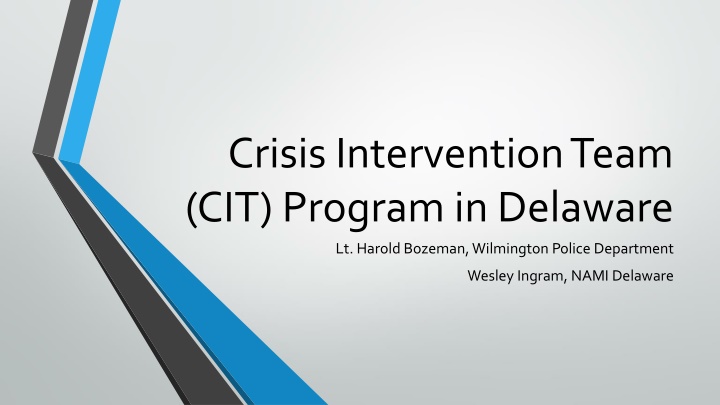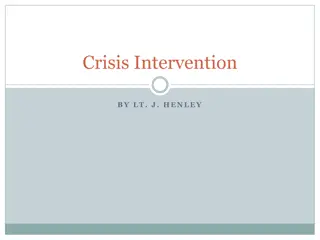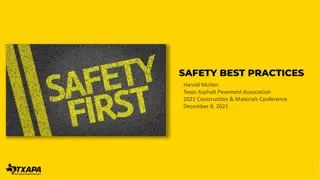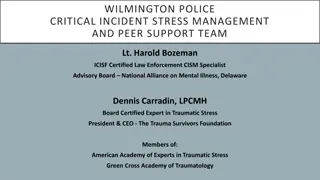CIT Program in Delaware: Lt. Harold Bozeman, Wesley Ingram
Providing insight into the Crisis Intervention Team (CIT) Program in Delaware led by Lt. Harold Bozeman from the Wilmington Police Department and Wesley Ingram from NAMI Delaware. This program focuses on enhancing crisis response strategies and mental health support within the community. Learn about the collaborative efforts aimed at ensuring effective intervention and assistance during critical situations.
Download Presentation

Please find below an Image/Link to download the presentation.
The content on the website is provided AS IS for your information and personal use only. It may not be sold, licensed, or shared on other websites without obtaining consent from the author.If you encounter any issues during the download, it is possible that the publisher has removed the file from their server.
You are allowed to download the files provided on this website for personal or commercial use, subject to the condition that they are used lawfully. All files are the property of their respective owners.
The content on the website is provided AS IS for your information and personal use only. It may not be sold, licensed, or shared on other websites without obtaining consent from the author.
E N D
Presentation Transcript
Crisis Intervention Team (CIT) Program in Delaware Lt. Harold Bozeman, Wilmington Police Department Wesley Ingram, NAMI Delaware
CIT History & Overview CIT was created in 1988 in response to a fatal shooting of a man living with serious mental illness by a Memphis PD officer. Memphis Police, NAMI, and the University of Memphis partnered together to develop the CIT program in order to improve outcomes with individuals living with mental illness. CIT programs have now been implemented across the country and in several other countries.
CIT History & Overview 40 hour program for law enforcement officers to enhance mental health understanding and de-escalation skills Many different topics relevant to engagement with individuals living with mental health conditions Extensive interactive component to practice de-escalation skills Follow-up program for LEOs who are also veterans: Veteran Response Team (VRT) 16 hour program for CIT officers with military experience to enhance ability to de-escalate veteran in crisis
CIT History & Overview From Ret. Major Sam Cochrane, Co-Chairman of CIT International Board of Directors: CIT is more than just a training. CIT is an evolving program -it is effective through: Partnership and collaboration Policy Continued training
CIT as a National Best Practice Research has shown: Arrest rates declining after implementing CIT program (Franz & Borum, 2010) Increased rates of referral or transport and lower rates of arrest for CIT officers when compared to non-CIT officers (Compton, et.al., 2014) During an escalating mental health crisis scenario, CIT officers were less likely to perceive nonphysical action as ineffective and more likely to choose less escalating options compared to non-CIT officers (Compton, et.al., 2011)
CIT Facilitates System Relationships Officers made aware of the available resources and make contacts with service providers If issues arise with providers, officers now have reliable contact information to ease process NAMI Delaware receives officer feedback to aid in our advocacy for system improvement
CIT is Empowering Officer feedback has highlighted that it is empowering officers to utilize de- escalation in situations CIT Officers take the initiative on mental health related calls CIT Officers stay involved in the CIT process, volunteering as role-players for scenarios portion of training Brings realism to the scenarios for current participants Maintains contact with service providers who also offer input during scenario process
Sources Compton MT, & et al. The police-based crisis intervention team (CIT) model: II. Effects on level of force and resolution, referral, and arrest. 2014: https://pubmed.ncbi.nlm.nih.gov/24382643/ Franz S & Borum R. Crisis Intervention Teams may prevent arrests of people with mental illnesses. 2010: https://doi.org/10.1080/15614263.2010.497664 Compton MT, et. al. Use of force preferences and perceived effectiveness of actions among Crisis Intervention Team (CIT) police officers and non-CIT officers in an escalating psychiatric crisis involving a subject with schizophrenia. 2011: https://pubmed.ncbi.nlm.nih.gov/19933714/ NAMI. Crisis Intervention Team (CIT) Programs. https://www.nami.org/Advocacy/Crisis- Intervention/Crisis-Intervention-Team-(CIT)-Programs CIT International. What Is CIT? https://www.citinternational.org/What-is-CIT























